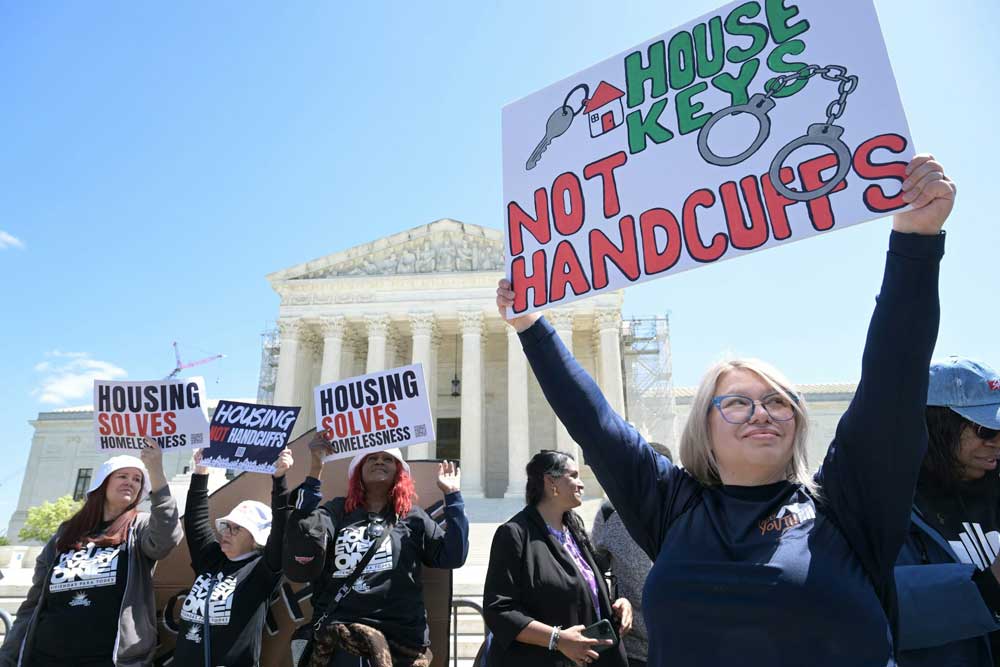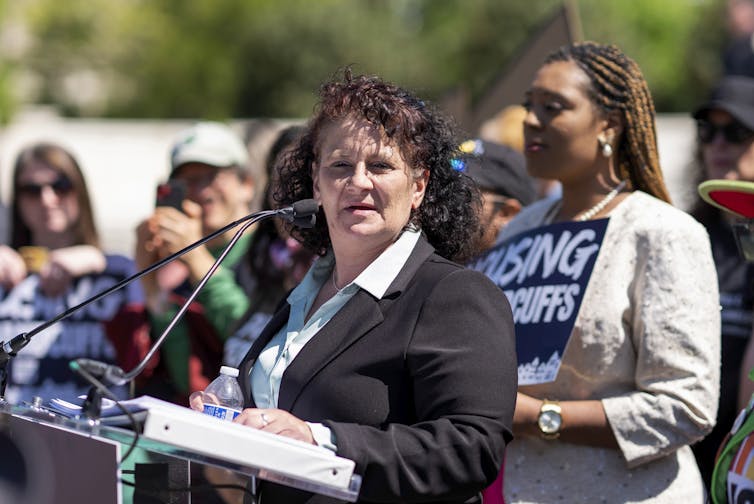
By Clare Pastore
The Supreme Court has ruled that the Eighth Amendment to the U.S. Constitution does not prohibit cities from criminalizing sleeping outdoors.
City of Grants Pass v. Johnson began when a small city in Oregon with just one homeless shelter began enforcing a local anti-camping law against people sleeping in public using a blanket or any other rudimentary protection against the elements – even if they had nowhere else to go.
The court confronted this question: Is it unconstitutional to punish homeless people for doing in public things that are necessary to survive, such as sleeping, when there is no option to do these acts in private?
In a 6-3 decision written by Justice Neil Gorsuch, the court said no. It rejected the claim that criminalizing sleeping in public by those with nowhere to go violates the Constitution’s prohibition on cruel and unusual punishment. In my view, the decision – which I see as disappointing but not surprising – will not lead to any reduction in homelessness, and will certainly result in more litigation.
As a specialist in poverty law, civil rights and access to justice who has litigated many cases in this area, I know that homelessness in the U.S. is a function of poverty, not criminality, and that criminalizing people experiencing homelessness in no way helps solve the problem.
The Grants Pass case
Grants Pass v. Johnson culminated years of struggle over how far cities can go to discourage homeless people from residing within their borders, and whether or when criminal sanctions for actions such as sleeping in public are permissible.
In a 2019 case, Martin v. City of Boise, the 9th U.S. Circuit Court of Appeals held that the Eighth Amendment’s cruel and unusual punishment clause forbids criminalizing sleeping in public when a person has no private place to sleep. The decision was based on a 1962 Supreme Court case, Robinson v. California, which held that it is unconstitutional to criminalize being a drug addict. Robinson and a subsequent case, Powell v. Texas, have come to stand for distinguishing between status, which cannot constitutionally be punished, and conduct, which can.
In the Grants Pass ruling, the 9th Circuit went one step further than it had in the Boise case and held that the Constitution also banned criminalizing the act of public sleeping with rudimentary protection from the elements. The decision was contentious: Judges disagreed over whether the anti-camping ban regulated conduct or the status of being homeless, which inevitably leads to sleeping outside when there is no alternative.
Grants Pass urged the Supreme Court to abandon the Robinson precedent and its progeny as “moribund and misguided.” It argued that the Eighth Amendment forbids only certain cruel methods of punishment, which do not include fines and jail terms.
The homeless plaintiffs did not challenge reasonable regulation of the time and place of outdoor sleeping, the city’s ability to limit the size or location of homeless groups or encampments, or the legitimacy of punishing those who insist on remaining in public when shelter is available.
But they argued that broad anti-camping laws inflicted overly harsh punishments for “wholly innocent, universally unavoidable behavior” and that punishing people for “simply existing outside without access to shelter” would not reduce this activity.

AP Photo/J. Scott Applewhite
In today’s decision, the court rejected the city’s invitation to overrule the 1962 Robinson decision and eliminate the prohibition on criminalizing status, but denied that being homeless is a status. Instead, the court agreed with the city that camping or sleeping in public are activities, not statuses, despite the plaintiffs’ evidence that for homeless people, there is no difference between criminalizing “being homeless” and criminalizing “sleeping in public.”
The decision is surprisingly thin on Eighth Amendment analysis. It declines to engage with plaintiffs’ arguments that criminalizing sleeping imposes disproportionate punishment or imposes punishment without a legitimate deterrent or rehabilitative goal.
Instead, the court returned over and over to the idea that the 9th Circuit’s decision required judges to make impermissible policy decisions about how to respond to homelessness. The court also extensively cited friend-of-the-court briefs from cities and others discussing the difficulties of addressing homelessness. Significantly, however, neither these briefs nor the court’s decision cite evidence that criminalization reduces homelessness in any way.
In a strong dissent beginning “Sleep is a biological necessity, not a crime,” Justice Sonia Sotomayor, joined by Justices Elena Kagan and Ketanji Brown Jackson, quoted extensively from the record in the case. The dissent included some shocking statements from the Grants Pass City Council, such as “Maybe [the homeless people] aren’t hungry enough or cold enough … to make a change in their behavior.”
Sotomayor noted that time, place and manner restrictions on sleeping in public are perfectly permissible under the Ninth Circuit’s analysis, and that the inevitable line-drawing problems upon which the majority dwells are a normal part of constitutional interpretation. She also observed that the majority’s contention that the Ninth Circuit’s rule is unworkable was belied by Oregon’s own actions: in 2021, the state legislature codified the Martin v. Boise ruling into law.
A national crisis
Homelessness is a massive problem in the U.S. The number of people without homes held steady during the COVID-19 pandemic largely because of eviction moratoriums and the temporary availability of expanded public benefits, but it has risen sharply since 2022.
Scholars and policymakers have spent many years analyzing the causes of homelessness. They include wage stagnation, shrinking public benefits, inadequate treatment for mental illness and addiction, and the politics of siting affordable housing. There is little disagreement, however, that the simple mismatch between the vast need for affordable housing and the limited supply is a central cause.
Crackdowns on the homeless
Increasing homelessness, especially its visible manifestations such as tent encampments, has frustrated city residents, businesses and policymakers across the U.S. and led to an increase in crackdowns against homeless people. Reports from the National Homelessness Law Center in 2019 and 2021 have tallied hundreds of laws restricting camping, sleeping, sitting, lying down, panhandling and loitering in public.
Under presidents Barack Obama and Joe Biden, the federal government has asserted that criminal sanctions are rarely useful. Instead it has emphasized alternatives, such as supportive services, specialty courts and coordinated systems of care, along with increased housing supply.
Some cities have had striking success with these measures. But not all communities are on board.
Pushing people out of town
I expect that this ruling will prompt some jurisdictions to continue or increase crackdowns on the homeless, despite the complete lack of evidence that such measures reduce homelessness. What such laws may well accomplish is to push the issue into other towns, as Grants Pass officials candidly admitted they sought to do.
The decision will likely put even more pressure on jurisdictions that choose not to criminalize homelessness, such as Los Angeles, whose mayor, Karen Bass, has condemned the ruling. While this ruling resolves the Eighth Amendment claims against sleeping bans, litigation over homeless policy is doubtless far from over.
This is an updated version of an article originally published April 17, 2024.
![]()
Clare Pastore is Professor of the Practice of Law at the University of Southern California.






























Skibum says
I am not a heartless, soulless, uncaring person, and I do have compassion and empathy for those less fortunate souls who seem to be homeless with not a lot of options. Many of the challenges that local governments have been dealing with for quite some time are the result of inaction and loss of financial resources toward mental health issues. Society must do better. I remember when Reagan was president and his administration started cutting funding for mental health facilities, which started the ball rolling nationwide to reduce or completely eliminate entire facilities designed to house seriously mentally ill people. Consequently, our jails and prisons gradually became the only secure facilities to house this population even though they were not, and are still not designed, equipped or staffed with the right kind of qualified people to properly help the mentally ill. Having said that, local governments must have the ability to make laws to address the homeless who think it is ok to set up tents and camps in public spaces, on sidewalks and in city or county parks. That should never have been allowed to begin with, and I am ok with the Supreme Court’s decision allowing local governments to legally prohibit such takeovers of these public spaces by homeless people. At the same time, it will be incumbent on local, state and federal governments and agencies to start putting more money and resources for homeless and mental health in their budgets so those with little or no resources have avenues they can take advantage of to ensure they are not packing themselves into public spaces and damaging these areas with trash, feces, syringes, etc. This experiment of taking critical resources away from mental health issues in our country must be seen as a failure and fixed, and we must learn from this long misadventure to ensure we never have to live through what we have seen expand over the last few decades and become such an enormous problem in far too many of our urban areas.